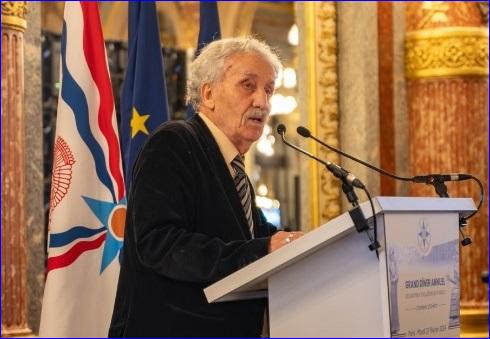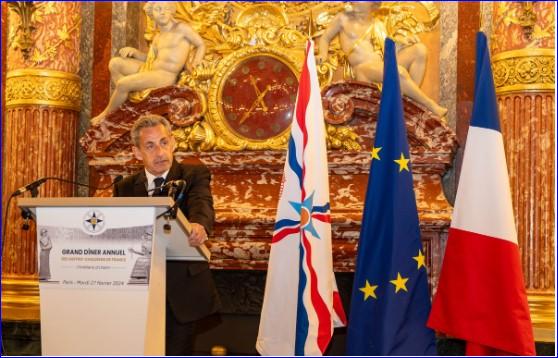


The resolution highlights that Assyro-Chaldean people were victims of serious and recurrent persecution and of several massacres even to the First World War, notably during 1895-1896 and between 1915 and 1918, the Ottoman government organized the mass murder of the Assyro-Chaldean population, their exodus from the borders of the empire and their forced conversion to Islam.
Considering the importance of remembrance and respect for human dignity, the National Assembly made a call on the French Government
- to officially recognize as having a genocidal character, the mass extermination, deportation and suppression of the cultural heritage of more than 250,000 Assyro-Chaldeans by the Ottoman authorities, between 1915 and 1918; [editor's note: 750,000 Assyrians were killed in the genocide].
- to condemn the genocide committed by the Ottoman authorities against the Assyro-Chaldeans between 1915 and 1918;
- to encourage on the international scene free access to archives relating to the massacres perpetrated between 1915 and 1918, at the end of the Ottoman period, in order to enable historians to continue their research aimed at establishing and documenting the facts of this period;
- to encourages the work of remembrance, particularly in education and culture, in order to make better known the events that took place during this period of history and the suffering that resulted from them.
The resolution echoes a similar text, largely adopted in February 2023 by the French Senate (AINA 2023-02-09).
Related: The Assyrian Genocide
Professor Joseph Jacoub has been engaged at the fore-front in the process of these recognitions both by the French Senate and French National Assembly. He has been recently interviewed by the French daily Le Figaro on this subject. We had the opportunity to talk to him as well. The interview was conducted in French.
Abdulmesih BarAbraham (AB): You and your dear wife Claire have been part of the Working Committee on the Assyro-Chaldean Genocide, chaired by Mr. François Pupponi, honorary depute, alongside senators, other deputies and last not least the Association of the Assyro-Chaldeans in France (AACF). What tipped the scales in favor of this overdue but remarkable recognitions of the genocide of the Assyro-Chaldeans by France?
Prof. Joseph Yacoub (JY): It was years of hard work carried out by the Assyrian (known also as Chaldean and Syriac) communities around the world which placed this genocide on the agenda.
In France, the Assyro-Chaldean community from Turkey is to be commended for making this tragedy visible and audible. Their work has been crucial in the Val-d'Oise département. I'm thinking in particular of the Association des Assyro-Chaldéens de France (AACF), founded in 1987 in Sarcelles, which I've had the honor of supporting since its creation, along with my friends Pétrus Karatay and Naaman Adlun. The AACF has worked tirelessly with town halls, departmental services, regions, ministries and politicians to make this genocide known and recognized, and has joined forces with the other association, Union des Assyro-Chaldéens de France (UACF).
In short, it has been a real collective effort that has borne fruits: The erection of several steles commemorating the genocide accompanied by numerous publications and events. In 2015, the commemoration of the centenary of the genocide had a major impact. François Pupponi, former deputy mayor of Sarcelles, is to be commended for his constant support of the community.
A landmark event took place on February 8 last year, when the French Senate adopted by an overwhelming majority of votes cast the resolution (n° 227) presented by Valérie Boyer and Bruno Retailleau, on the recognition of the genocide. Thus, for the first time in France, the issue was subjected to public scrutiny on a national and high political level.
AB: How important was the participation of former President Nicolas Sarkozy at the AACF Annual Grand Dinner on 27 February 2024, who in his speech called on the French President, Emmanuel Macron, to recognize the genocide of the Assyro-Chaldeans by France? In his speech, President Nicolas Sarkozy stated that the Assyrians were the indigenous people of Mesopotamia and that "it is not imaginable to have the Middle East without you. I am giving you my full support. The Assyrian Genocide must be acknowledged, as was the Armenian Genocide."

AB: One of the demands in the resolution is to "encourages the work of remembrance, particularly in education and culture, in order to raise awareness of the events that took place during this period of history and the suffering that resulted from them." How could this be accomplished? Is genocide education going to be anchored in school textbooks?
JY: The fourth paragraph of the single article which establishes this recognition effectively concerns the encouragement of the work of memory, "in particular through teaching and culture, in order to make better known the events that occurred during this period of the "history, and the suffering that results from it."
This element was taken up by speakers during the public session at the National Assembly on April 29. One MP declared on that: "I understand it as an invitation to preserve and disseminate Assyro-Chaldean culture, in consideration of its contribution to the wealth of humanity." Another MP was delighted that the text was accompanied of a real work of memory, stating: "Beyond the simple knowledge of the facts, a work of transmission, through teaching and culture is incumbent upon us, so that the memory of this genocide fulfills its role: to enable future generations to remain vigilant."
So these are the perspectives that are opening up. We hope this will bear fruit.
AB: The resolution adopted by the National assembly is not politically binding for the government. Though reticent about this parliamentary decision, the government did not call for a vote against it. How would you interpret this?
JY: It's true that this resolution is not binding. Nevertheless, it does have an important symbolic and political value. The genocide and the Assyrian-Chaldean people have entered the consciousness of the highest levels of government, and that's what we need to remember. Ten of the eleven speakers voted in favor of recognition.
The government was not reticent. The speech delivered to the National Assembly by Madame Chrysoula Zacharopoulou, Secretary of State for Development and International Partnerships, was rich in clarity and support for Eastern Christians and the plight of the Assyro-Chaldeans.
AB: What is the scope of the recognition of the genocide by the French Parliament? And what could be the consequences?"
JY: On February 8, 2023 and April 29, 2024, the Assyro-Chaldeans made history. The genocidal and ethnocidal tragedy of 1915-1918 was recognized (by resolutions) based on its own reasoning by both Houses of the French Parliament. This is clearly an unprecedented act of history, for truth and justice, which honors the memory of our suffering people.
France has always been there when it comes to defending the Assyro-Chaldeans and Eastern Christians in general. There is no shortage of examples. Here, I would like to salute François Pupponi, Bruno Retailleau, Valérie Boyer, Sylvain Maillard, Anne-Laure Blin and all the senators and deputies who have made this recognition possible by the French Parliament.
Because it happened in France, the repercussions have been and will continue to be worldwide. The messages we receive in France encourage Chaldo-Assyrians to follow the same path elsewhere. As a matter of fact, during the debates, a deputy concluded his speech as follows: "We hope that its adoption, coming after a similar vote by the Senate, will trigger international recognition of the genocide of the Assyro-Chaldeans."
AB: As expected, the Turkish government denounced the resolution passed by the French lawmakers. In a statement, the Turkish Foreign Ministry said that the resolution makes unfounded accusations related to the Assyrian and Chaldean communities living under the Ottoman Empire. The resolution is "an example of efforts to distort historical events for the sake of political interests," the ministry said. Do you think Ankara will one day recognize the Armenian and Assyrian genocides?
JY: Today, within Turkish civil society and intellectual circles, a movement is taking shape, despite the difficulties. I'm thinking in particular of the Turkish historian Professor Taner Akçam, author of numerous works on the Armenians, such as: A Shameful Act. The Armenian Genocide and the Question of Turkish Responsibility (2006).
It is regrettable that the Turkish authorities persist in their policy of denial. Turkey would be honored to acknowledge these dark pages of the Ottoman Empire, with which, as far as we know, the Turkish Republic, born in July 1923, broke away. When we look at the history of Turkish literature, we see that it is rich in humanism. The poet Tevfik Fikret (1867-1915), who was familiar with the Christian communities of his country, wrote: "The earth is my homeland, the human race my nation."
AB: Now that dozen of country parliaments recognized the Assyrian Genocide, don't you think that Assyrians has to bring the issue to the next level and seek recognition of the UN, similar to the Armenian Genocide?
JY: I think it's premature at the moment. Today, and above all, it is a question of making our Assyrian-Chaldean-Syriac people better known through their culture, in order to better consolidate their foundations and their contribution to humanity, and to deepen international awareness. In this context, as paragraph three of the resolution stipulates, it is necessary to "encourage free access on the international scene to archives relating to the massacres perpetrated between 1915 and 1918, at the end of the Ottoman period, in order to enable historians to continue their research aimed at establishing and documenting the facts of this period."
All this requires thorough research, constant effort and constant action. The rest will inevitably follow. Let's be confident about the future, and work together to revitalize our cultural heritage in the place where we now call home.
AB: Professor Jacoub, thank you for the Interview.
Professor Joseph Yacoub is honorary professor of political science at the Catholic University of Lyon and was the first holder of UNESCO's Chair of "Memory, Cultures and Interculturality." He is an expert on minority issues, human rights and Eastern Christianity. He is the author of numerous books and articles on the Assyro-Chaldeans and the Oriental Christians. His most recent books (co-written with his wife Claire Yacoub) is "Martyrs par amour en Perse. Mgr Sontag et ses trois compagnons" (Martyrs for Love in Persia. Bishop Sontag and his three Companions) and "Deux chrétiens d'Orient en Gaule, Jacques d'Assyrie et Abraham d'Euphrate" (Two Christians of the Orient in Gaul, Jacques of Assyria and Abraham of Euphrates) (Éditions Lacour, 2024). Joseph Yacoub is born in Hassake, Syria. His parents, originally from Iranian Azerbaijan (Salamas district), suffered during the Turkish genocide of Assyrians during World War I, taking refuge in Georgia before settling in Syria in 1921.

or register to post a comment.